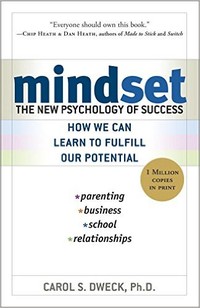Growth Mindset
-
Building a Growth Mindset Culture
Council Rock is committed to developing a growth mindset school environment—a place where all students believe that with effort and perseverance, they can succeed. Dr. Carol Dweck, a researcher at Stanford University, has identified two belief systems about intelligence.
In the left panel of this webpage, under the Growth Mindset link, you will find an infographic that depicts the differences between fixed and growth mindsets.
More About Fixed and Growth Mindset
A fixed mindset is one where we believe that our children’s innate abilities, talents, and intelligence are fixed. They are either “good” or talented at something or they are not. They can certainly learn new things, but this particular skill or subject is not really their “thing.”
Sometimes we think, “My daughter probably isn’t very good in math because I was not very good in math.” Or, “I was not good in high school English, so I guess my son takes after me.” These are examples of fixed mindset thinking. Even a perceived positive statement like, “He is a born leader” demonstrates fixed mindset thinking.
As a parent, you may have fixed mindset thinking about your own abilities; you may think, “I can’t cook”, “I can’t dance; I have two left feet”, “I leave that to my spouse, I can’t figure it out.”
A growth mindset is the belief that intelligence, skills, and talent are malleable, and they can change with effort, perseverance, and practice. Neuroscience explains this as neuroplasticity. We can all get “smarter.”
Mindset and Praise
We need to focus feedback on what a child does, not who he or she is. It’s important to avoid making comments like, “You are so smart!” Instead we want to praise effort and hard work. In the left panel of this webpage, under the Growth Mindset link, you will find a video discussing how to praise children.
One of the most frequently used words in your vocabulary should be the word yet, such as, “You are not quite getting it yet, but with practice, you will.” In the left panel of this webpage, under the Growth Mindset link, you will find two videos about the power of “yet:” one in which Carol Dweck describes the power of that little word and a Sesame Street video with Janelle Monae singing about the power of “yet.”
Learning from Failure
From the moment our children are born, we want to protect them. Our instincts are to catch them before they fall. It is not easy seeing our children not have success in whatever goal they are working toward—from learning to walk to getting into their first choice of college. But in order to raise resilient, confident, optimistic children, we must learn to be comfortable when they make mistakes and/or fail. When children are given opportunities to struggle, it builds resiliency. Without struggle it is difficult to develop coping skills and resiliency. As parents, we must model this as well; let your kids see you being persistent and overcoming challenges—not quitting because something is “too hard.”
When you see a less-than-desirable score or grade on an assignment, assessment, or report card, do not panic. Look at the grade as data, look at failure as data, and talk with your kids about some things that can be done to improve and grow. If your child put a lot of effort into the assignment, then talk about some new ways that may help him or her understand the content. Reinforce that it is not about the grade or doing everything perfectly—it is about the learning that takes place.
Check out the link under Growth Mindset in the left panel to view a 31-second Michael Jordan commercial about failure. In this commercial, Jordan highlights many of the mistakes he has made and what the outcome is: success.
Let’s all work together
to build a growth mindset environment.


